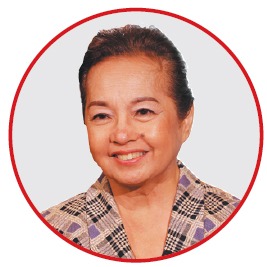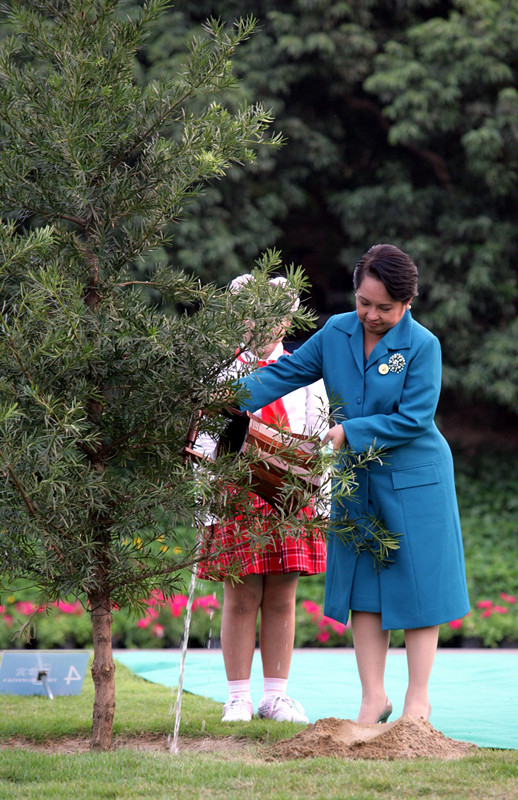
April 5, 1947, in Lubao, Pampanga province, the Philippines
In 1961, when she was 14 years old, Gloria Macapagal Arroyo's father Diosdado Macapagal was elected president of the Philippines.
In 1964, she studied for two years at Georgetown University's Walsh School of Foreign Service in Washington, where she was a classmate of future US president Bill Clinton.
She earned a bachelor's degree in economics from Assumption College in the US, graduating in 1968. She pursued a master's in economics at Ateneo de Manila University in 1978, and a PhD in economics at the University of the Philippines Diliman in 1985.
Arroyo was an economics professor from 1977 to 1987 at several universities, including the University of the Philippines and Ateneo de Manila University.
She entered politics in the 1992 election, running for senator. She was vice-president of the Philippines from 1998 to 2001, before serving as the 14th president of the Philippines between 2001 and 2010.
She is now a member of the House of Representatives representing the second district of Pampanga and was the deputy speaker of the 17th Congress from 2016 to 2017.
Arroyo was elected speaker of the House of Representatives on July 23, becoming the first woman to hold the position.
She was recognized by Asiaweek as one of Asia's most powerful women in 2001, and ranked fourth in Forbes' most powerful women list in 2005.
A Philippine view of 40 years of 'breathtaking' changes

The 19th CPC National Congress set out a clear and strategic plan on deepening reform on all fronts and opening up wider to the world in the new era. It said the central task will be supply-side structural reform, reflecting China's determination to give the market the decisive role in resources allocation. At the same time, China will open its door wider to the world and increase alignment of domestic practices with international economic and trade rules.
In April, President Xi Jinping pledged China will embrace further reform and opening-up when addressing the opening of the Boao Forum for Asia in Hainan province.
Xi said in his speech that history has shown opening-up was key to China's economic growth over the past 40 years, and, in the same vein, high-quality development of China's economy in the future can only be achieved with greater openness.
"China's door of opening-up will not be closed and will only open even wider," Xi said. "It is a strategic decision made by China based on its need for development as well as a concrete action taken by China to move economic globalization forward in a way that benefits people across the world."
Xi announced an array of measures at the forum to continue opening the country's economy, including broadening access to the Chinese market, enforcing strong protection of intellectual property rights, lowering tariffs on vehicle imports, importing more products that are competitive and needed by the Chinese people, and holding the first China International Import Expo in Shanghai in November.
"We are very impressed and encouraged by the informative speech made by President Xi Jinping, about the need for further reform and opening-up," said Arroyo, who became a board member of the Boao Forum for Asia at its annual conference this year.
Arroyo said the China-proposed Belt and Road Initiative, which encourages two-way trade and mutual investment between all countries and aims to build an open world economy, is an important platform for China to develop cooperation with other countries, including the Philippines.
"I would describe the importance of the initiative by using the language of computers - the software and the hardware," said Arroyo, who is also the permanent honorary chairperson of the Philippines Silk Road International Chamber of Commerce.
"The software of the relations of China with other countries would be the trade and investment agreements, like the free trade agreement between the Association of Southeast Asian Nations and China, because those agreements constitute the framework for trade and investment to thrive, but you also need hardware - the modern infrastructure - that is where the Belt and Road comes in."
She said the Philippines is discussing a series of cooperative projects with China under the Belt and Road Initiative, including some railway projects. Some are coming to close a deal while others are still preparing the paper work, she said.
Arroyo said she was impressed by Xi's proposal to build a community of shared future for mankind, saying the Belt and Road Initiative serves as an important platform to achieve this end.
The bilateral relationship between China and the Philippines has witnessed ups and downs in the past 40 years, but Arroyo said she is optimistic about the future.
"If you look at the long term, a succession of presidents in the Philippines will carry on the same policy," she said.
Another reason for her optimism is the large and important Philippine-Chinese community, she added, which has been in her country for many years and has been important to the bilateral relationship.
Arroyo called for people-to-people exchanges, saying they were key to the countries' relations.
"Because at the end of the day, government is the body of a country, but people are the heart of a country," she said. "So people-to-people exchanges are like what I was doing for the Association for Philippines-China Understanding. I found that was the natural way to develop ties between our two countries and two peoples."
Arroyo also called for ASEAN countries to treat China as a "collaborator, donor and market".
"When China was beginning to develop in 1978, many were somewhat fearful that China would become a rival," she said. "But in the past years, we did not predict that China was going to be in a class all its own. Now we see China is not a rival, it is a collaborator, a market and a donor."
The rise of China had been healthy for the Philippines and ASEAN, she added.


